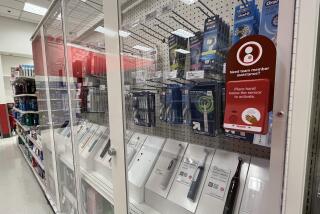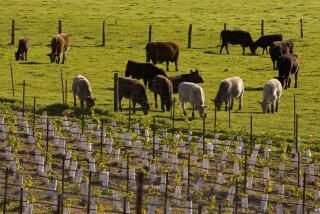Bill aims to weed out fraudulent farmers market vendors
SACRAMENTO — California farmers markets want to get tough with interlopers who don’t sell what they grow.
They’re backing a bill to crack down on vendors who falsely claim to offer pesticide-free or locally grown fruits, nuts and vegetables.
“Californians are fortunate to have the highest concentration of farmers markets in the nation,” said the bill’s author, Assemblyman Roger Dickinson (D-Sacramento).
The bill, AB 1871, he said, would “increase consumer protections and accountability at our certified farmers markets, protect local farmers and help this growing sector of the economy continue to thrive.”
The bill would make it a misdemeanor to make false statements about the origin and quality of agricultural products.
State-certified farmers markets have been a growth industry in the Golden State, attracting urban consumers with super-fresh produce that many cooks and diners prefer to supermarket fare. The number of farmers markets statewide has more than doubled in the last decade from about 400 to more than 800, industry officials say.
But the popularity of such markets is threatened by a small but growing incidence of fraud involving the sale of produce from wholesalers and cold-storage facilities.
“It’s difficult to control,” said Dan Best, general counsel for the California Federation of Certified Farmers’ Markets in Sacramento. “This is an attempt to put as much integrity as we can into an enterprise.”
The bill, similar to one that stalled last year, calls for a fine of up to $2,500 and a jail sentence of up to six months for a conviction. The legislation, supporters said, has little or no opposition.
Drought plan
Business leaders praised emergency drought legislation, unveiled last week by Gov. Jerry Brown and top Democratic lawmakers. But the $687-million package, they stress, is only part of the solution to the state’s water woes.
The governor’s plan offers direct relief, including housing and food, to farmworkers hit by the drought. It also would provide money from voter-approved bonds for dozens of projects to capture storm water, use more recycled water, increase conservation and boost underground storage.
“It’s a step in the right direction,” said Gary Toebben, president of the Los Angeles Area Chamber of Commerce. “Acting quickly will save jobs and help save our economy.”
But Toebben and others insist that much more is needed: bringing more water to farmers and cities in the San Joaquin Valley and Southern California and building reservoirs to store water from wet years.
The new facilities have “got to be a critical component for planning to alleviate future droughts,” said Rob Lapsley, president of the California Business Roundtable in Sacramento.
Heavy metal
Want to pick up some machinery, control mechanisms or tools? Southern California Edison is having an auction at its permanently closed San Onofre nuclear power plant near San Clemente at the end of next month. Click here for more information.
But don’t expect any nuclear surprises. Edison assures that nothing being sold is “associated with radiological operations.”
Twitter: @MarcLifsher







